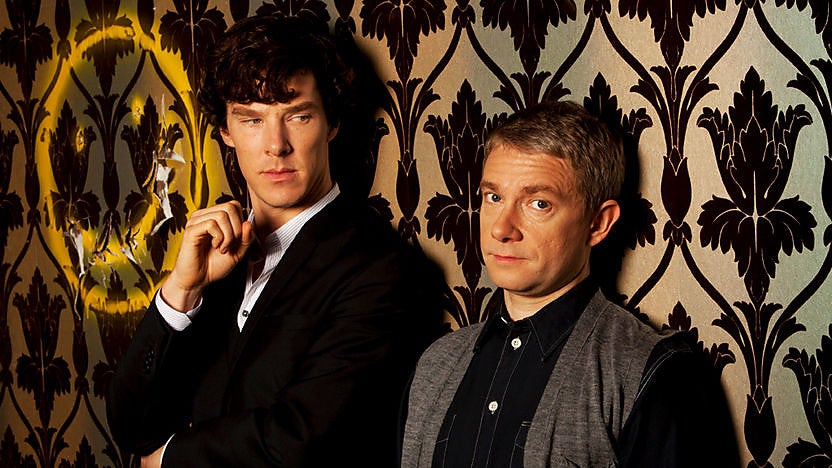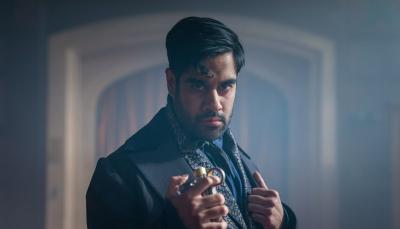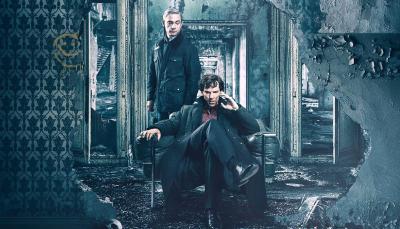The Game Is On: Why 'Sherlock' is the Best Bit of TV You Should Be Watching

So whether you’re a hardcore fan who’s already mainlined the Series 3 episodes through a proxy server sixteen times, a newcomer who stumbled onto a random episode on Netflix, or someone who just has a friend that won’t shut up about that Benedict Cumberbatch guy, Sherlock is what you should be doing on Sunday night.
But why? Sunday nights are already slam packed with great television options – trust me, I know, my DVR exists in a permanent state of tears about this situation – so why should you devote any of your precious viewing time to this random British show starring that guy with the crazy sounding name that takes multi-year hiatuses and emotionally destroys your life?
It’s difficult to attempt to distill my love for this show down in to bite size chunks that don’t make me sound crazy, but, let’s give it a whirl.
Why watch Sherlock? Well…
Benedict Cumberbatch. Everyone knows that Benedict Cumberbatch has had something of a banner year in the entertainment industry, and this is basically the role that started it all for him. His Holmes is a masterful mix of unlikeable, charming, funny, arrogant, brilliant, awkward and more than a little bit broken – he is, as Detective Inspector Lestrade notes in the series pilot, a great man who nevertheless needs a bit of a shove (in the form of John Watson) to become a good one. (Props to commenter John O'Connel below who caught that I had that quote backward originally. Like Sherlock says, it's always something!) The joy of Cumberbatch’s performance is not just that he gets the genius right – it’s difficult to watch him spout off complex deductions at rapid speed and not get giddy – but that he also reminds us that Holmes is, at the heart of everything, so crushingly, recognizably human.
Martin Freeman. You might know Freeman best from his turn as the adorkable Tim on the original British The Office, but he’s at his best here, as the straight man to Cumberbatch’s intense, occasionally all over the place genius. Freeman’s great talent is making the ordinary seem extraordinary, and his down-to-earth humanity is what makes up the heart of this show. His John is – perhaps more than any other Watson before him – Sherlock’s partner; brave, intelligent in his own way and damaged enough to be interesting (or “not boring”, I suppose, in Sherlock’s vocabulary).
The Best Best Friendship in Literary History. Every Sherlock Holmes adaptation, in some way, is about mysteries and deductions, fascinating villains, and the burden of genius, but at the heart of everything is that this is the story of an unlikely and life-changing friendship between two very different people. Sherlock and John bring out the best in one another, and it’s obvious that they’re each the most important person in the other’s world. Plus, Cumberbatch and Freeman have the best chemistry of any duo on television – bar none. (Seriously, just try to imagine if this show had any other people in it but these two. I mean, the horror.)
My Favorite City Looks Amazing. This whole show is a love letter to London – which is as much a part of Sherlock as any character. It adds a sense of place, of permanence, of grounding, that’s somehow necessary in a show like this. Sherlock knows London inside and out, from random alleyways, to typical cab routes, to the habits of its police force, to the homeless that live in its streets. It's a world that is realized down to the ground, and it's gorgeous. And best of all - Conan Doyle’s London is still there, underneath – both figuratively and literally in some cases. This show remembers that. And that’s cool.
It Respects Your Intelligence. If you’re a mystery fan of any stripe, you’ve doubtless encountered those sorts of shows where if they show you someone in the first act, you already know they’re a red herring, and you’re well aware that a high-profile guest star means that their character is the culprit. Sherlock doesn’t work like this. Sure, there are some issues and plot holes to be had (don’t get me started on Belgravia), but for the most part Sherlock expects you, as a viewer, to be smart enough to keep up. The dialogue is quick and clever, the story moves at a rapid pace, significant clues are dropped in plain sight without fanfare. In this day and age of television that spells everything out for you in bold face, it’s a nice change.
Ugh, The Feelings. While this show is stuffed full of twists and turns enough to delight even the most die-hard mystery fan, what keeps me coming back to it is that despite the whole focus on crime and cases and villains and genius, this is a show about characters and their relationship to one another. This is why it’s basically impossible to watch the end of The Reichenbach Fall and not cry:
[This video is no longer available.]
The Cases Aren’t Really the Point. Sure, there are a bunch of mysteries that get solved in Sherlock. There are masterful deductions, fascinating mysteries, a great villain, and surprise twists. But, interestingly enough - and possibly for the first time in a TV adaptation like this – the stories aren’t really that important. I mean, they are, I like the odd Conan Doyle shout out as much as the next Holmes fan, and I love the deductions and the thrill of seeing a well plotted mystery play out. But this isn’t a detective show. It’s a show about a detective. To steal a phrase from the man himself, in a lot of ways, the cases are all just transport – what we’re solving is Sherlock himself. The show is an exploration of everything that is fascinating, frustrating, infuriating and amazing about Sherlock Holmes, and he is, truly, the case of a lifetime.
We’ve waited so long for Series 3, guys. Enjoy it. And come back for the recaps. They’re…. rather involved, I’ll just leave it at that.
What made you start watching Sherlock? What keeps you watching? How would you rank it in the pantheon of Holmes adaptations out there?




